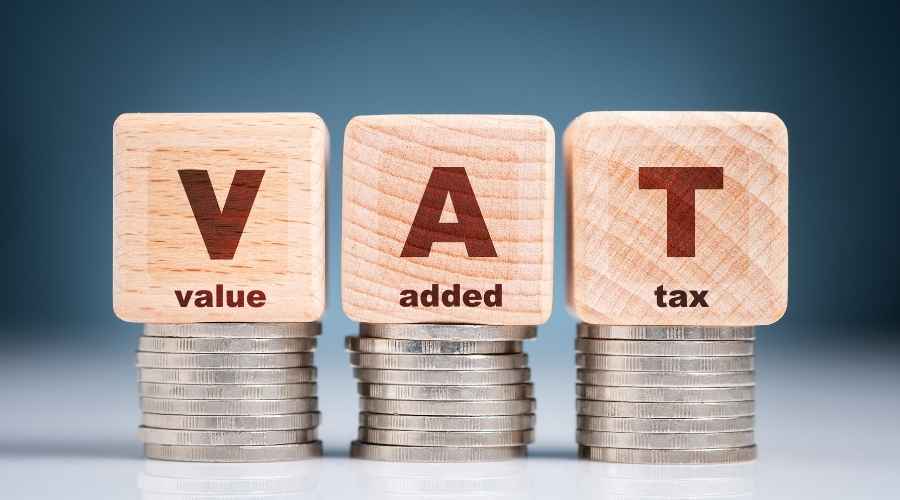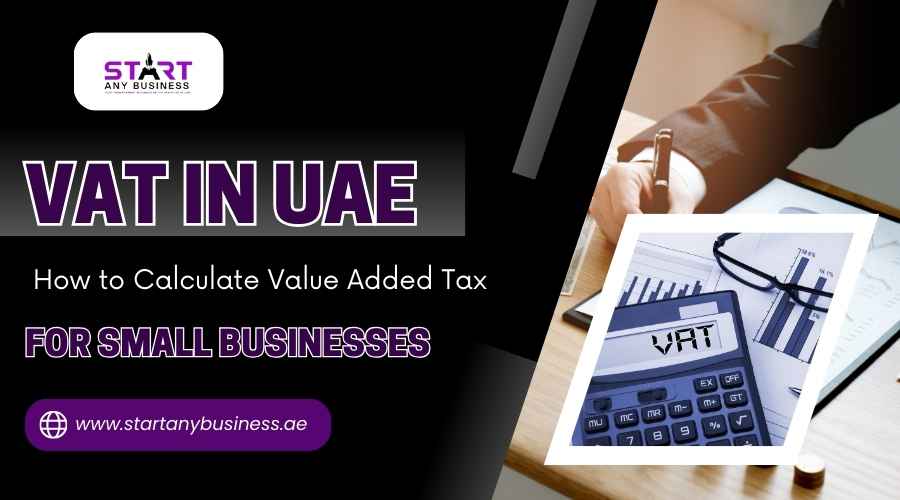Value Added Tax (VAT) is a type of consumption tax that was introduced in the UAE on January 1, 2018. This specific tax is applied throughout the comprehensive supply chain, which is from the phase of production of goods or services to their final purchase by the end consumer. To set up business in Dubai, it is crucial to understand how VAT is calculated. This is necessary to identify a business’s tax obligations, maintain compliance with regulatory protocols, and manage financial operations adequately. To compute the VAT amount, one must multiply the value of taxable supplies by the applicable VAT rate of 5%.
Through this blog, let’s understand what VAT is and how it is calculated for businesses in the UAE.
What is VAT in the UAE (Value Added Tax)? Understanding VAT Basics
Value Added Tax is a form of consumption tax that applies to most transactions, including goods and services. It is classified as an indirect tax because it is not paid directly to the government by the end consumer, but instead, it is gathered by businesses at each stage of the supply chain. These businesses are then responsible for forwarding the tax to the government. The amount of VAT added is usually a fixed percentage of the sale price. The rate of VAT services in Dubai is around 5%.
- Input VAT is a type of value-added tax that a business pays when purchasing goods or services for its operations.
- Output VAT, on the other hand, is the tax that a business adds to the price of the goods or services it sells to its customers.
- VAT Liability is the net amount that a business owes to the tax authority after balancing the tax it has collected (Output VAT) with the tax it has paid (Input VAT). This liability is calculated by subtracting Input VAT from Output VAT.
This tax system is executed in several countries worldwide. Each country has its own set of rates and regulations. As VAT influences the final price of goods and services, it plays a key role in financial planning and pricing strategies when you open a company in Dubai.
VAT Registration Eligibility: When Should Your Business Register?
When you set up business in Dubai, you are required to know if your business is eligible for VAT or not. To comprehend this, start by evaluating your taxable turnover. This includes the total value of all goods and services you supply, along with imports.
1. Mandatory Registration
Your business must register for VAT if:
- You are established in the UAE and your taxable supplies and imports exceed AED 375,000 over the previous 12 months or are expected to cross that threshold in the next 30 days.
- You are a non-UAE-based business that makes taxable supplies within the UAE, regardless of the amount, and no other party is responsible for the VAT.
2. Voluntary Registration
If your taxable supplies and imports are above AED 187,500 but below the given threshold of AED 375,000, either over the past 12 months or projected in the next 30 days, then you may choose to register voluntarily. Smaller businesses usually fall within this range, although registration is not compulsory. For example, if your business generates AED 200,000 in annual sales, you are eligible for voluntary registration.
The Process of Calculating VAT: Comprehensive VAT Calculation Formula

To compute VAT accurately, use this formula:
VAT Payable = Output VAT – Input VAT
- Input VAT Example: If a business buys goods worth AED 150 and the VAT rate is 5%, the input VAT would be AED 7.50 (150 × 5%).
- Output VAT Example: If the business sells goods for AED 300, the output VAT would be AED 15.00 (300 × 5%).
The net VAT payable is calculated by subtracting the input VAT from the output VAT.
1. Recording Output VAT
Output VAT is the tax a business adds to the sale of its goods or services. It is paid by the buyer.
Example: A stationery store sells products worth AED 1,000. With a 5% VAT rate in the UAE, the VAT comes to AED 50. So, the customer is charged AED 1,050 in total. The journal entry to record this sale would be:
- Debit: Cash/Bank AED 1,050
- Credit: Sales Revenue AED 1,000
- Credit: Output VAT Payable AED 50
2. Recording Input VAT
Input VAT is the tax paid on business-related purchases. This can be recovered if it is more than the output VAT.
Example:
The stationery store buys supplies from a wholesaler for AED 500, plus AED 25 VAT, which totals AED 525. The journal entry to record this purchase would be:
- Debit: Office Supplies Expense AED 500
- Debit: Input VAT AED 25
- Credit: Cash/Bank AED 525
Common Mistakes While Calculating VAT and How to Avoid Them
Here are some of the common VAT calculations mistakes that you should avoid:
- Misclassifying Supplies: When you open a company in Dubai, there should not be any confusion between exempt, zero-rated, and standard-rated supplies. This can lead to incorrect VAT calculations.
- Mistakes in Calculating VAT: Make sure to use the appropriate formula and rates to avoid the underpayment and overpayment of VAT.
- Record-Keeping: Uphold comprehensive statements of all transactions to verify VAT calculations and declarations.
Tips for Efficient VAT Management
Here is what businesses in Dubai need to take into consideration when looking for efficient VAT management:
- Consult with VAT Experts: For a newly set-up business in Dubai, hiring a VAT consultant will be a good idea to navigate through the tax systems. They use accounting software to provide accurate VAT calculations and compliance.
- Stay Updated: Businesses must regularly evaluate the latest VAT regulations and laws, and also get guidance from the FTA.
- Keep Detailed Records: Having adequate documentation that supports VAT dealings is essential to support the VAT claims.
Conclusion
Value Added Tax (VAT) plays a crucial role in modern economies across the globe. It is also an important aspect to consider when you setup business in Dubai. This tax comes across as a key revenue route for governments and allows them to finance vital public services and infrastructure development. Furthermore, VAT guarantees consistent government income that provides financial stability even during economic slowdowns.
Setting up a business in Dubai comes with a range of opportunities, but navigating the complexities of VAT and taxation policies can be extremely challenging. That is where Start Any Business (SAB) steps in. We help entrepreneurs to establish their businesses in the UAE and simplify tax compliance and strategy. Even if you are looking for VAT registration, ongoing support, and advice, our experts guarantee that your business stays on the right side of the law.





